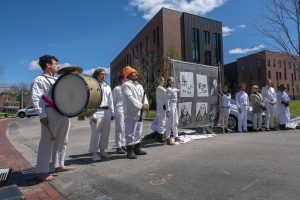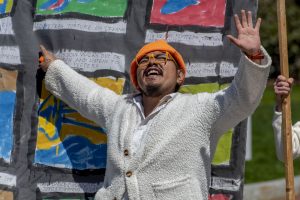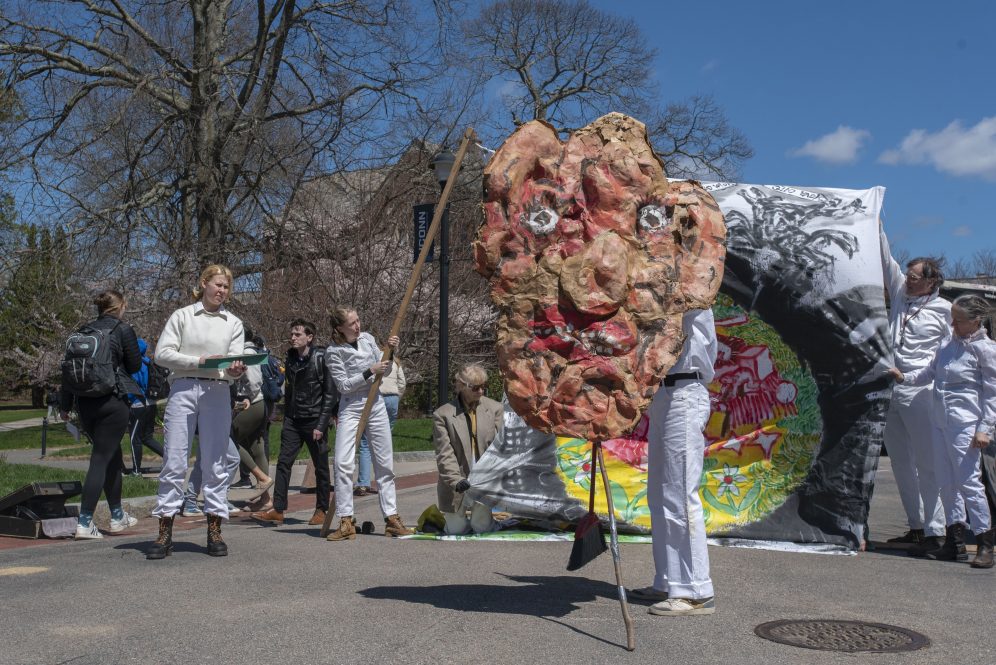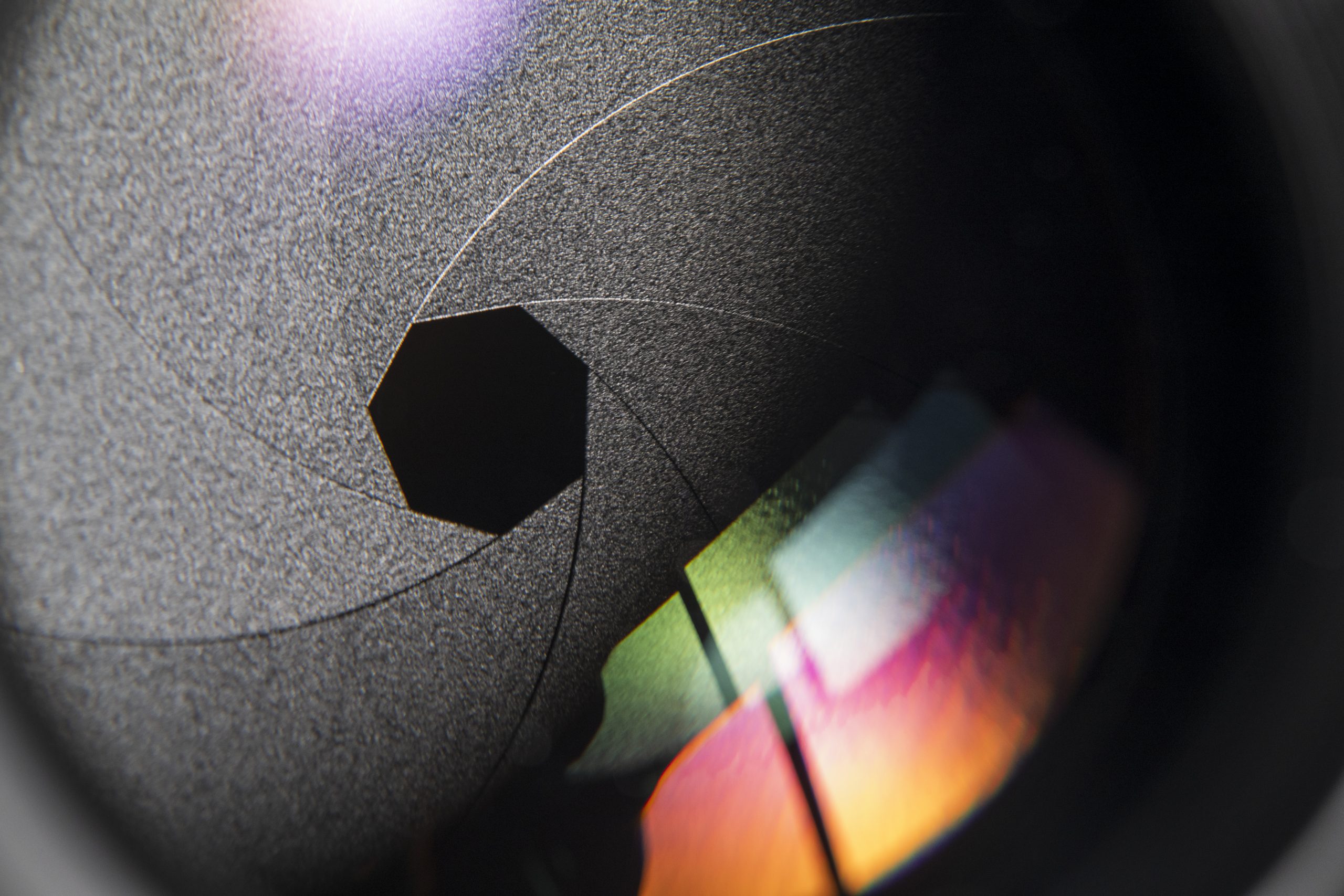Like a cooped-up marionette stretching its body for the first time in two years, UConn’s Puppet Arts Program emerged from hibernation this week to welcome the Bread and Puppet Theater for a series of events that mark a return to public performances after a pandemic put them to rest.
Sure, there have been small-scale outdoor programs on the town square in Downtown Storrs, but Wednesday’s street show on Fairfield Way and this weekend’s portrayal of “The Persians” on the South Campus Lawn will be among the first spectacles since 2020.
This has been a long time coming, says Ballard Institute and Museum of Puppetry Director John Bell, and it’s unique for UConn to host such a large event in “The Persians.”

“Normally when we host performances, it’s a one-, two-, or maybe four-person company that performs in our intimate theater in front of an audience of 50, on a small stage, and with a hand puppet or marionette show,” says Bell, an associate puppetry professor, of the Ballard theater. “Bread and Puppet is coming with a company of 16 and they’re working with 15 to 20 community volunteers.”
And for this show, the puppets, masks, and props are life-sized – giant to some degree – and built for outdoor viewing.
Bread and Puppet – a touring group that calls a converted hay barn in Glover, Vermont, home base – took up residency at UConn on Monday to begin working with show volunteers and set the stage for a week of events that began with the noontime street performance Wednesday on Fairfield Way. It’s an American tradition, Bell says, rooted when circus performers used to travel the country for street shows.
The week of activities continued Thursday with a noontime in-person and online Ballard Institute Puppet Forum at the Dramatic Arts Department’s Mobius Space. But performances of “The Persians” on Saturday and Sunday are expected to draw the most attention.
Bell says he approached Bread and Puppet’s founder and director Peter Schumann in 2018 about bringing a show to UConn, using an outdoor space. Schumann settled on the Greek tragedy “The Persians,” given the amphitheater-like setting of the South Campus Lawn.
“When Athens commissioned Aeschylus to write the official celebration piece for the Greeks’ miraculous victory over the vastly superior Persian Empire invasion force, they must have expected just that: a glorification of national prowess and skill,” Schumann says. “What they got instead is the opposite: heartrending compassion for the slain enemy, lamentation for the despairing mothers and widows of the slain warriors.”
“It’s a very sympathetic view of the enemy,” Bell says of the story. “Unlike a classic Greek tragedy where there’s an introduction, complication, climax, and denouement, this one starts out bad and gets worse. It shows what’s left of the Persians when they come home. People have died in the war and it’s a big defeat for this empire.”
War and its resulting destruction have been a recurrent theme for Schumann, who grew up in Germany during World War II and witnessed the horrors first-hand: “Like a lot of people who have experienced war, it’s sort of with you all the time and it emerges in different aspects of Bread and Puppet’s work,” Bell says.
While planning for “The Persians” – and certainly its writing in 472 BC – began long before the invasion of Ukraine in February, Bells says the war theme is particularly relevant today for both general audiences and Schumann.
“We’re all thinking about Ukraine, being a refugee and being forced from your home, dealing with the violence of war, its bombings and invasions. That trauma, which is so hard to understand and to think about, is something Schumann has thought about a lot, and it shows up in his work,” Bell says.

Schumann adds of the play’s empathetic view of the enemy, “Can our own permanently warring military industrial empire learn from this?”
While the play’s subject matter might not evoke the pleasantries of spring renewal, Bell notes that “people go see ‘Hamlet’ or ‘MacBeth’ or action films and they have a very positive experience. This will be no different particularly because you have community engagement in the 20 volunteers on stage. Some of them are your friends or neighbors performing with these very colorful puppets, giant puppets, with masks and with huge paintings.”
The audience will be sitting outside, in what Bell hopes will be a beautiful spring afternoon, and it will be a time to bring people together after having hibernated for too long.
“As an outdoor community event, it’s a wonderful way to make theater,” Bell says.
“The Persians” will be performed Saturday and Sunday, April 23-24, at 4 p.m. on the South Campus Lawn, 626 Gilbert Road, Storrs. Ticket are $15 for adults and $10 for students and can be purchased online. Parking will be available in the S lot. Audience members should bring blankets or chairs for the outdoor performance. In the event of inclement weather, the show will move to the E.O. Smith High School auditorium.



